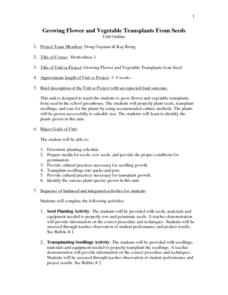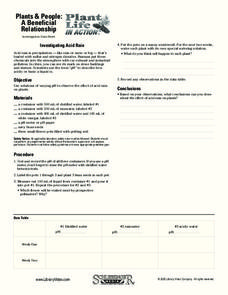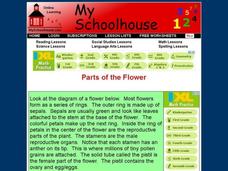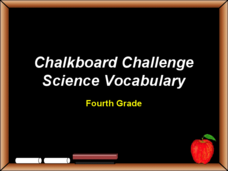Curated OER
Growing Flower and Vegetable Transplants From Seeds
Young scholars grow flower and vegetable transplants from seed in the school greenhouse. They properly plant seeds, transplant
seedlings, and care for the plants by using recommended culture methods. In addition, they identify the...
Curated OER
Just Bee-Tween Flowers!
Learners examine the major plant and bee parts and the interdependency between bees and fast plants. They observe and record the stages of growth of fast plants, take photos of the plant's life cycle, and cross-pollinate plants.
Curated OER
Growth and Changes in Plants
Pupils investigate the growth and changes in plants. They view a video and discuss the changes in plants. They work in small groups to demonstrate vocabulary words to the class. They visit a green house and take pictures of plants to...
Curated OER
Plant Life In Action
Int his plant worksheet, students folllow the given directions to create an experiment. Students then answer 5 short answer questions and complete the given data table with results for two weeks.
Curated OER
Bigger Flowers
Students discuss flowers and their parts, examine works by Georgia O'Keeffe, and draw, color, or paint large flowers.
Curated OER
Dana's Flower Garden
In this spring reading comprehension worksheet, students read a one page story about flowers and gardening. Students then answer 6 questions about the story.
Curated OER
What Are Plant Life Cycles?
In this plant life cycles worksheet, students will write in the main idea of the life cycle of a flowering plant. Then students will write in 3 supporting details.
Curated OER
Parts of the Flower
For this biology worksheet, students examine a diagram of a flower and read a selection that describes all of the parts including the petals, the stamen, the anther, and the sepals. They answer 11 on-line fill in the blank questions...
Curated OER
How Do Plants Meet Their Needs?
In this plants worksheet, students will compare and contrast the purpose of the flower, fruit, and seeds of a plant. Students will fill in the blank of 5 statements in this graphic organizer.
Curated OER
Plants
For this word scramble worksheet, students unscramble the words that relate to plants. Students increase the plant vocabulary and spell 12 words.
Curated OER
Parts of the Plants
Second graders discuss as a class what they know about plants viewing several pictures of plants as well as a tree poster. They work in groups to observe a flowering plant which is removed from a pot with the soil brushed away and is...
Curated OER
Creating a Pollinator Garden
Students build a pollination garden. In this pollination lesson, students read directions and build a pollinator garden that will produce flowering plants for pollinator organisms to use in pollination of other plants.
Curated OER
Parts of the Plant and Their Functions
Delving into this slideshow will help the students understand the composition of plants and their structures. Each slide identifies certain structures and explores how they support the plant's survival along with assisting our...
Curated OER
Plant Parts
Little ones identify the parts of a plant and practice following directions at the same time. They color each part of the flowering plant the color indicated on the sheet. Roots are brown, leaves are green, the flower is red, and the...
Curated OER
Plants and Animals Crossword Puzzle
In this science worksheet, learners look for the answers to the questions to fill in the crossword puzzle using the theme of pants or animals.
Curated OER
How Does Your Garden Grow?
Young gardners read and listen to books about seeds, plants, and the growing process. They plant seeds in plastic cups to observe the process of root-growing and plant formation. The whole class walks through a field to collect seeds...
Curated OER
A Hidden Beauty
Expose the beautiful mystery of bulbs as young botanists learn all about these fascinating plants. They glean information from a short text before observing actual bulbs (consider an onion), and comparing their findings with predictions....
Curated OER
Chalkboard Challenge: Science Vocabulary
Review science vocabulary with your students using this Jeopardy-style PowerPoint. Categories for this game include: Solar System, Plants, Weather, Cells, and Rocks. There are a total of 25 clues; five for each category.
Curated OER
Let's Grow Plants!
Students read and dramatize the stories "The Tiny Seed" and "The Carrot Seed" as an introduction to seeds and what they become. They work in small groups to plant their own seeds and over the span of a week (+ or -)students keep track of...
Cornell University
Garden Math
Young scientists must put their math caps on and figure out what fraction of each flower is in a raised flower bed. They must problem solve to simplify the fractions, and then graph the amount of flowers that are in different flower beds.
Calvin Crest Outdoor School
Survival
Equip young campers with important survival knowledge with a set of engaging lessons. Teammates work together to complete three outdoor activities, which include building a shelter, starting a campfire, and finding directions in the...
DiscoverE
A Clever Way to Water
Your plants will survive without you. Scholars create a device that can water plants using a coiled string. Along the way, they learn about adhesion and cohesion of water. The challenge is to keep the plants alive for at least a week.
Kentucky School for the Deaf
Levels of Organization within an Ecosystem
From tiny organisms to entire biomes, young scientists examine the interdependent relationships tying all living and non-living things together with this collection of ecology resources.
Seussville
The Lorax's Earth Day
Add a touch of Dr. Seuss whimsy to your Earth Day celebration with six pages consisting of Earth-friendly, inspiring, and engaging activities designed to enhance the beauty of your school campus and showcase the famous story, The Lorax.

























